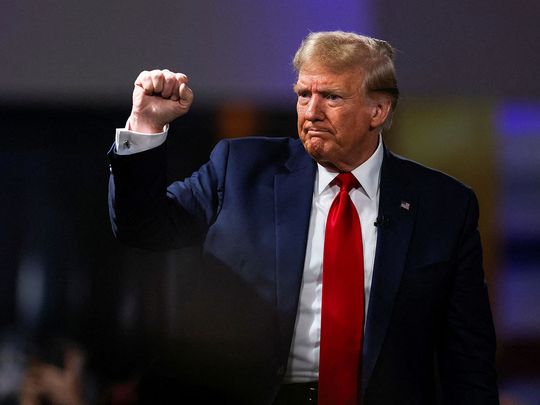
The prospect of Donald Trump potentially reclaiming the presidency casts a shadow over the security of European nations, especially regarding the future of Nato and the wider Euro-Atlantic security framework. From the EU perspective, Trump’s rhetoric, inviting Russia to test the resolve of Nato members not meeting defence spending targets, casts doubt on the alliance’s deterrence capabilities.
Trump’s historical scepticism towards Nato, highlighted by his recent remarks indicating a conditional approach to the alliance’s mutual defence commitments, introduces a degree of unpredictability into the strategic and military planning of European countries. This is particularly concerning for European nations that have recently joined the alliance or are in the process of joining.
Trump’s approach to Nato and international alliances is marked by significant scepticism and a transactional mindset, representing a departure from the long-standing post-World War II consensus that views collective security as essential for global peace and stability.
By casting doubt on the United States’ commitment to Article 5 — the mutual defence clause at the heart of Nato’s founding treaty — based on the fulfilment of defence spending thresholds, Trump’s stance challenges the deterrent effect that has been a central element of European security for decades.
This approach not only risks emboldening adversarial nations by hinting at potential divisions within the alliance but also places European countries, particularly smaller one, in a difficult position. They are forced to navigate a delicate balance between increasing defence spending and dealing with the unpredictability of US foreign policy.
The implications of such a policy stance are far-reaching. Firstly, it challenges the very essence of collective defence, transforming it from a guaranteed mutual support mechanism into a conditional arrangement. This could lead European countries, especially those on Nato’s eastern flank and in the Nordic region, to question the reliability of the United States as a security partner. In an environment where the threat perception remains high, the erosion of trust in Nato’s collective defence promise directly impacts the security calculus of these nations.
Secondly, Trump’s transactional view of alliances risks fragmenting the unity of Nato, as member states may be driven towards nationalistic and isolationist defence strategies in the face of perceived US unreliability. This fragmentation could lead to a weakening of the strategic coherence necessary to address complex security challenges, from cyber threats to hybrid warfare, that transcend national borders and require a unified response.
Shift of global strategic focus
Moreover, the conditional approach to Nato obligations signals to adversaries that the alliance’s collective will can be tested, potentially inviting aggression or coercive tactics against member states perceived as vulnerable. This not only places the immediate security of these nations at risk but also challenges the principle of international law and the norms that have governed interstate relations in the post-World War II era.
In the broader geopolitical context, Trump’s stance could accelerate the shift of global strategic focus away from the transatlantic alliance towards other regions or rival security arrangements. This shift could diminish the influence and relevance of European nations in shaping global security norms and responses to emerging threats, thereby impacting their long-term strategic interests.
Trump’s stance on Nato reflects a broader trend in his foreign policy approach, characterised by scepticism towards multilateral alliances and a transactional view of international relations. While Trump asserts that his demands for increased defence spending by European allies have led to a strengthening of Nato, his critics argue that his approach risks fracturing the alliance and eroding the strategic advantages it provides to the United States.
The reaction to Trump’s comments has been swift and critical from both sides of the Atlantic. European leaders and Nato officials have emphasised the importance of solidarity and mutual commitment to Article 5 of the Nato Treaty, which underpins the alliance’s collective defence guarantee. In the United States, the response has been mixed, with some Republicans downplaying the significance of Trump’s statements, while others express alarm at the potential implications for US security and global leadership.
Trump’s stance on Nato
The debate over Trump’s stance on Nato underscores a deeper divide within the Republican Party and American politics more broadly over the role of the United States in the world. This divide reflects broader questions about the value of alliances, the costs of global leadership, and the best strategies for ensuring national security in an increasingly complex international environment.
The potential return of Trump to the presidency underscores the need for European nations to reassess their security strategies. It calls for a more robust and unified European defence posture and greater strategic autonomy, to ensure their security interests are safeguarded irrespective of the vicissitudes of US politics.
This period of uncertainty highlights the enduring importance of diplomacy, alliance management, and a clear and consistent foreign policy grounded in collective security principles and shared values. As the 2024 presidential election looms, the future of European security hangs in the balance, reminding us the fragile character of a military alliances and the dangers of conditional commitments in an increasingly unpredictable global landscape.













